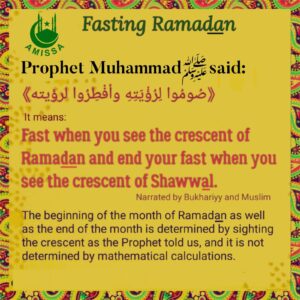*How does Ramadan starts*
The scholars of the four schools of Islamic madhhabs agreed that the basis for determining the beginning of Ramadan is as follows:
The crescent is observed with the naked eye after the sunset of the 29th day of sha’ban. If the crescent is sighted , then the following day will be the first day of Ramadan. If the crescent was not in view , then the next day will be the 30th day of sha’ban and the day after will be the beginning of Ramadan.
Muslims all around the world have implemented this practice in determining the beginning and the end of Ramadan and the highly knowledgeable scholars have ruled accordingly. Moreover, they have stated that the reliance should be placed on this rule and no attention should be given to the sayings of mathematicians and astronomers.

*From the Hadiths*
– Prophet Muhammad ﷺ said what means:
“Begin fasting Ramadan upon seeing the crescent and end it upon seeing the crescent of the following month. But if the crescent is blocked from view, then complete the fast for 30 days.”
Narated by imam Ahmad in his Musnad, Muslim in his Sahih and An-nasa’iyy and Ibn Majah in their Sunan through the route of Abu Hurayrah.
– Al bukhariyy, Muslim , and others narrated through the route of Abdullah ibn Umar, may Allah raise his rank, that the prophet said what means:
“The lunar month is 29 nights, so do not fast until you sight the crescent. But if the crescent was blocked from view, then complete the month to 30”
– Imam Ahmad , Muslim, Abu Dawud and Annasa’iyy all narrated that the prophet said what means:
“We do not rely on writings or calculations to determine the beginning or the end of the month. The month is either 29 or 30 days.
*From The Hanafiyy School*
Ibn Abidin , (died in 1252AH), in his annotations on Ad-durr Al Mukhtar said what means:
“The statement of the astronomers is not taken into consideration”. I.e. in determining the beginning and end of Ramadan.”
Moreover,the book Al Mi’raj states:
“Their sayings are not taken into considerstion by the scholarly consensus and it is not permissible for the astronomer to fast relying on his own calculation”
*From The Malikiyy School*
Shaykh Muhammad Ibn Ahmad Mayyarah Al Malikiyy,(died in 1072AH) in Addurr Aththameen said that Ashshahab al Qarafiyy (died in 684AH) related that Sanad (died in 541AH) said what means:
“If an imam ( Muslim ruler) declared the beginning of fasting based upon calculations, then the Muslims must not follow him, because the scholars of salaf agreed,by consensus ,that determining Ramadan by calculations is invalid”
– In Ashsharh al kabir Shaykh Ahmad addardir (died in 1201AH) said what means:
” It is stated that the beginning of Ramadan is not confirmed by the saying of an astronomer, neither for himself nor for others”
*From the Hambaliyy School*
In his book kashshaf Al qina’, Al buhutiyy al hambaliyy, died in 1051AH, said what means:
” If one intended to fast the 30th day of Sha’ban without relying on lawful evidence namely sighting the crescent or after completing Sha’ban 30 days then one’s fasting is invalid. Take the case for instance of the one who based his fasting on calculations or astronomy because the horizon was blocked by clouds; his fasting is invalid because his basis is religiously invalid. This judgment stands even if in reality these calculations often coincided with the beginning of Ramadan. Similarly, the one who fasts after a night of a clear sky based on calculations, his fasting is invalid for the same reason, even if valid testimony later revealed that the day had been the first of Ramadan.”
*From the Shafi’iyy School*
In his book Asna Al Matalib sharh rawd attalib, Shaykh zakariyya al ansariyy,died in 925AH, said what means:
“The calculations of the astronomers have no significance. They do not determine the obligation of fasting and it is a sin to rely on them for that purpose.”
Clearly, the scholars of the four schools agree that no consideration should be given to the sayings of astrologers, astronomers and/ or mathematicians for determining the beginning and end of the month of Ramadan. Moreover, many scholars conveyed the scholarly consensus on this ruling. Reliance should be placed upon sighting the crescent or completing 30 days of Sha’ban as mentioned by many numbers of scholars within these schools.
We advise every Muslim to abide by the sayings mentioned by the scholars of the four schools. The Muslim nation unanimously agreed on the high rank and integrity of those scholars. Let the Muslim learn the rules of fasting by studying under someone who possesses both knowledge and trustworthiness and is someone who has acquired the knowledge from another trustworthy and knowledgeable person, and so on until the continuous chain reaches right back to the prophet peace be upon him.
